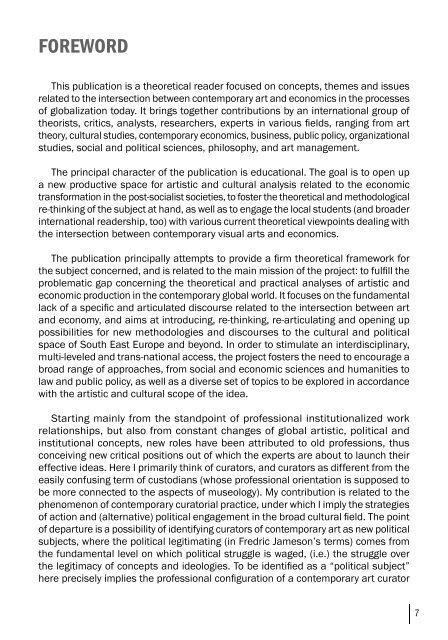art-e-conomy _ reader - marko stamenkovic
art-e-conomy _ reader - marko stamenkovic
art-e-conomy _ reader - marko stamenkovic
Create successful ePaper yourself
Turn your PDF publications into a flip-book with our unique Google optimized e-Paper software.
FOREWORD<br />
This publication is a theoretical <strong>reader</strong> focused on concepts, themes and issues<br />
related to the intersection between contemporary <strong>art</strong> and economics in the processes<br />
of globalization today. It brings together contributions by an international group of<br />
theorists, critics, analysts, researchers, experts in various fields, ranging from <strong>art</strong><br />
theory, cultural studies, contemporary economics, business, public policy, organizational<br />
studies, social and political sciences, philosophy, and <strong>art</strong> management.<br />
The principal character of the publication is educational. The goal is to open up<br />
a new productive space for <strong>art</strong>istic and cultural analysis related to the economic<br />
transformation in the post-socialist societies, to foster the theoretical and methodological<br />
re-thinking of the subject at hand, as well as to engage the local students (and broader<br />
international <strong>reader</strong>ship, too) with various current theoretical viewpoints dealing with<br />
the intersection between contemporary visual <strong>art</strong>s and economics.<br />
The publication principally attempts to provide a firm theoretical framework for<br />
the subject concerned, and is related to the main mission of the project: to fulfill the<br />
problematic gap concerning the theoretical and practical analyses of <strong>art</strong>istic and<br />
economic production in the contemporary global world. It focuses on the fundamental<br />
lack of a specific and <strong>art</strong>iculated discourse related to the intersection between <strong>art</strong><br />
and e<strong>conomy</strong>, and aims at introducing, re-thinking, re-<strong>art</strong>iculating and opening up<br />
possibilities for new methodologies and discourses to the cultural and political<br />
space of South East Europe and beyond. In order to stimulate an interdisciplinary,<br />
multi-leveled and trans-national access, the project fosters the need to encourage a<br />
broad range of approaches, from social and economic sciences and humanities to<br />
law and public policy, as well as a diverse set of topics to be explored in accordance<br />
with the <strong>art</strong>istic and cultural scope of the idea.<br />
St<strong>art</strong>ing mainly from the standpoint of professional institutionalized work<br />
relationships, but also from constant changes of global <strong>art</strong>istic, political and<br />
institutional concepts, new roles have been attributed to old professions, thus<br />
conceiving new critical positions out of which the experts are about to launch their<br />
effective ideas. Here I primarily think of curators, and curators as different from the<br />
easily confusing term of custodians (whose professional orientation is supposed to<br />
be more connected to the aspects of museology). My contribution is related to the<br />
phenomenon of contemporary curatorial practice, under which I imply the strategies<br />
of action and (alternative) political engagement in the broad cultural field. The point<br />
of dep<strong>art</strong>ure is a possibility of identifying curators of contemporary <strong>art</strong> as new political<br />
subjects, where the political legitimating (in Fredric Jameson’s terms) comes from<br />
the fundamental level on which political struggle is waged, (i.e.) the struggle over<br />
the legitimacy of concepts and ideologies. To be identified as a “political subject”<br />
here precisely implies the professional configuration of a contemporary <strong>art</strong> curator<br />
7


